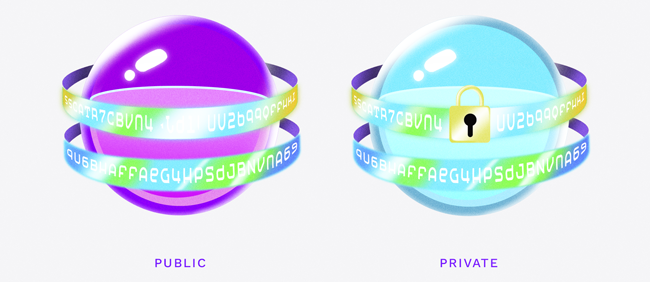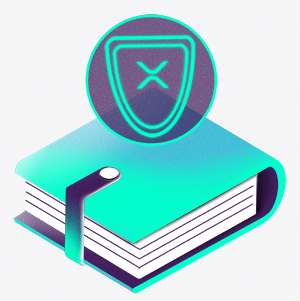Lesson 6
How does blockchain technology improve payments?
Enabling easy and reliable transaction validation

Blockchain is changing the way we interact with money and value. Just like in our community analogy, blockchain removes the need for a central authority to oversee how we transfer value. This means that payments can be processed much faster, and at a lower cost.
But what protects the money if all the code is open source? The value lies in public keys and private keys, as well as the digital wallets used to store currencies.
These cryptographic inventions are a big part of the solution that enable anyone, anywhere to hold, send and receive digital assets—and money—at global scale. With the help of these cryptographic keys, payment instructions can be digitally signed, so validators in blockchain networks can validate the authenticity of transactions.
Let’s take a look at public keys, private keys, and digital wallets in more detail.

Public key
This is a unique alphanumeric code that acts as your public address on the blockchain. It’s like your bank account number—anyone can see it and send funds to it but only the person who knows the private key associated with the public key is able to move funds from it.
Private key
Similar to a password, your private key is a unique code that proves ownership of your public key. It’s what allows you to access your funds and make transactions. It’s important to keep the key safe and secure, as anyone with access to it can sell your assets.
Many types of private keys exist, including the following:
- 64 digit hexadecimal code
- Mnemonic phrase
- 256 character long binary code
- QR code
The mathematical formula to generate private and public keys is open source, so how does no one else have the ability to create the same key? Generating a new private key requires “randomness.” Randomness can be represented as a string of random bits, and normally software like wallets will obtain these from the operating system.
Wallets
A digital wallet is like a physical wallet, but instead of storing cash or cards, it stores your private and public keys. As such, your assets don’t actually live inside your wallet, but rather on the blockchain itself – the wallet just provides a way to access your assets.
There are many different types of wallets available, including:
- Paper wallets
- Desktop wallets
- Mobile wallets
- Hardware wallets
Each has its own set of features and security considerations, so it’s important to choose one that’s right for you.

How is blockchain changing the financial system?
Here are a few key ways that blockchain is changing the game for payments:
Banking for the unbanked
Perhaps one of the most exciting uses of blockchain technology is its potential to reach people who are ‘unbanked’ or ‘underbanked.’ These are the people who don’t have access to traditional banking services, which often leaves them excluded from the global economy.
With blockchain, anyone with a mobile phone can send and receive payments via their digital wallet. This is a gamechanger for the estimated 1.7 billion people who are unbanked and nearly 2 billion more that are considered underbanked.
Higher speeds and lower costs
Traditional payment systems can take days to process international payments and can incur hefty fees. Blockchain-powered payments can be processed quickly and for a fraction of the cost of traditional payments.
Increased security
Traditional payments can have data leakage and fraud. Information is kept on centralized servers, which means hackers have a single point of attack and are incentivized to attempt a breach.
Information on the blockchain is distributed across a network of nodes, making it much harder to hack. Additionally, each transaction is encrypted and wallets can only be accessed with a private key.
This increased security is a game-changer for the payments industry, which has been struggling to keep up with the ever-evolving threats posed by hackers.
These are just a few of the ways that blockchain is changing the game for financial services. With its potential to reach the unbanked, as well as its increased security and efficiency, it’s no wonder that more and more institutions and individuals are turning to this innovative technology.
